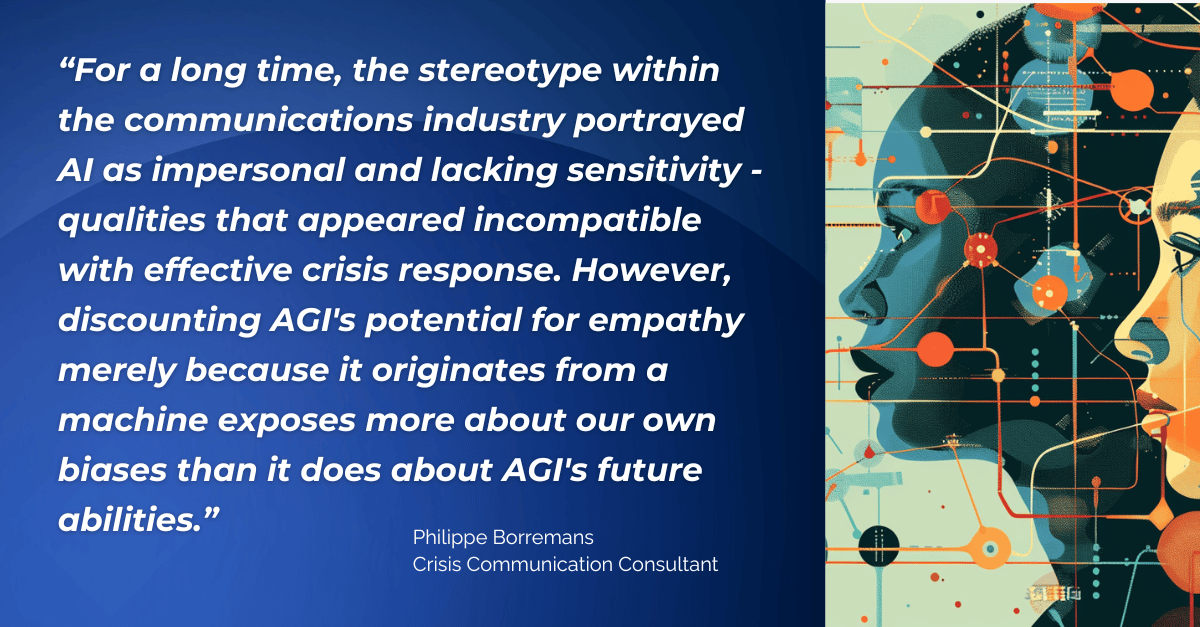Dear {{ first_name | reader }},
If you read news about AI and artificial general intelligence (AGI), it may seem like we are getting closer to living alongside something as intelligent as us.
Many companies, including Meta and OpenAI, say they are almost there to achieve AGI. However, it's hard to determine if this is just hype or actually true.
In this edition of Wag The Dog, I try to shed light on the potential impact on our profession if AGI becomes a reality and explore the possible changes and challenges that could arise for our roles.
Enjoy the “what if” scenario(s) 👍
Artificial General Intelligence (AGI) versus AI
Artificial General Intelligence (AGI) differs from currently available AI systems in a fundamental way that is particularly relevant for professional communicators.
Today's AI systems are like specialists in a communications team, each with their own competencies and limitations. For example, one tool may be great for analysing social media sentiment, another for writing press releases, and yet another for monitoring media coverage.
Each system works within its defined parameters and is ideally suited to certain tasks.
AGI, on the other hand, would be something of a versatile communications director, able to take on any task across the communications spectrum.
This 'director' would not only execute tasks, but also understand the underlying strategies, creatively adapt to new challenges, and learn from the results to improve future performance.
AGI would be able to seamlessly integrate all communications functions, from strategy development to tactical execution and from audience analysis to message personalisation.
For a crisis communications specialist, AGI would mean having a tool that not only assists with routine tasks, but also provides strategic insights, anticipates problems, and even understands the complex dynamics of human emotions and relationships that are critical to managing a crisis.
AGI could handle the unpredictable and multi-layered nature of crises with a level of sophistication and adaptability that current AI systems cannot offer.
Potential implications of AGI on crisis and emergency communication.
In contrast to existing AI, which is characterised by machine learning and narrow AI applications for specific tasks, AGI would have the ability to understand, learn, and perform a wide range of intellectual tasks at a level comparable to or even surpassing human intelligence.
This distinction is critical when considering the potential impact on crisis communication.
Improved decision-making and strategy formulation
AGI could analyse vast amounts of data from multiple sources in real time, giving crisis communication specialists unparalleled insight into evolving situations.
This could lead to more informed decision-making and the development of highly effective communication strategies tailored to the nuances of each crisis.
Real-time language translation and cultural adaptation
With AGI's advanced understanding and learning capabilities, it could provide real-time translation and cultural customisation of communication materials.
This would allow professionals to reach and engage global audiences instantly - a task that currently takes a lot of time and effort.

Predictive analysis and crisis forecasting
AGI's predictive capabilities would likely surpass today's AI systems, allowing it to recognise potential crises before they fully erupt.
For crisis communication specialists, this means the ability to prepare for and potentially prevent certain crises from escalating by proactively addressing the underlying issues.
Ethical and empathetic communication
One of the biggest challenges for AGI would be to achieve the human capacity for empathy and ethical judgement in communication.
While AGI could theoretically learn these aspects by analysing large amounts of human interaction data, the intricacies of empathetic and ethical communication during a crisis may still require human oversight.
Crisis communication specialists would need to ensure that the communication generated by AGI upholds the values of the organisation and is sensitive to the emotional state of the audience.
Continuous learning and adaptation
The ability of AGI to continuously learn and adapt could change the role of crisis communication specialists.
Rather than simply creating and disseminating messages, they could oversee and guide AGI to ensure it aligns with strategic objectives and intervene as needed to adjust messages or strategies based on evolving situations and feedback.
Science Fiction or…
When will AGI be achieved? Nobody knows for sure, but in a survey conducted in 2022, 738 AI experts estimated a 50% chance of achieving advanced machine intelligence by 2059.*
But when AGI is achieved, the impact on crisis communication will be enormous and could significantly improve the efficiency, effectiveness, and reach of communication strategies.
However, the human element, particularly in terms of ethical considerations, empathy, and strategic oversight, would still be essential.
Crisis communication specialists would need to adapt to a new paradigm where their role expands to managing and steering AGI capabilities to ensure that technology is used responsibly and effectively to manage crises.
What do you think?
Did you check out my crisis and emergency communication resources yet? You can download templates, checklists, and practical guidance on this page. You will find tools such as a Crisis Communication Plan Template, the Audience Canvas for Emergency Communication, and much more.
Sponsor
Unlock unparalleled efficiency for your communication team with Typing Mind Custom – the bespoke ChatGPT solution that's private, secure, and fully tailored to your organization's needs.
Embrace cutting-edge GPT-4 technology, integrate seamlessly with internal data, and maintain total control with self-hosting options. Step into the future of team collaboration and ensure your communications are smarter, faster, and more aligned than ever.
Conferences and webinars:
22/02: I’ll be speaking at a webinar organised by the Emergency Planning Society in the United Kingdom on February 22 and will cover crisis communication and AI. (Members only)
05/03: Another webinar on the topic of crisis communication and the impact of AI but this time organised by Insignia. You can register for the webinar here.
Near future: I’ll be running sessions on crisis, risk, and emergency communication in collaboration with Piar in the context of their “State Of Social Listening” series. Check out their current scheduled webinar.
What I am reading/testing/checking out:
How satisfied were you with the content in this edition? 📚
Before you go…
If you have found my articles helpful or gained knowledge from them, I would greatly appreciate it if you could spare a few moments to write a review.
Your review will help me improve and also assist other communication professionals in finding the resources they need to do well in their roles.
Thank you for your support! It's readers like you that make Wag The Dog more than just a newsletter.
A Quick Note on How I Create Content for Wag The Dog
As you know, I'm passionate about AI and its applications in the fields of PR and crisis communication. So, it shouldn't come as a surprise that I use AI to help draft my articles.
Why? Well, for starters, English isn't my first language. While I'm comfortable with it, AI gives me that extra edge to ensure clarity and coherence. Secondly, I write about AI, so what better way to understand its capabilities than to use it in my own work?
I value transparency, so it's crucial for you to know that although AI assists me in drafting, I personally review and edit each article to guarantee its authenticity.
